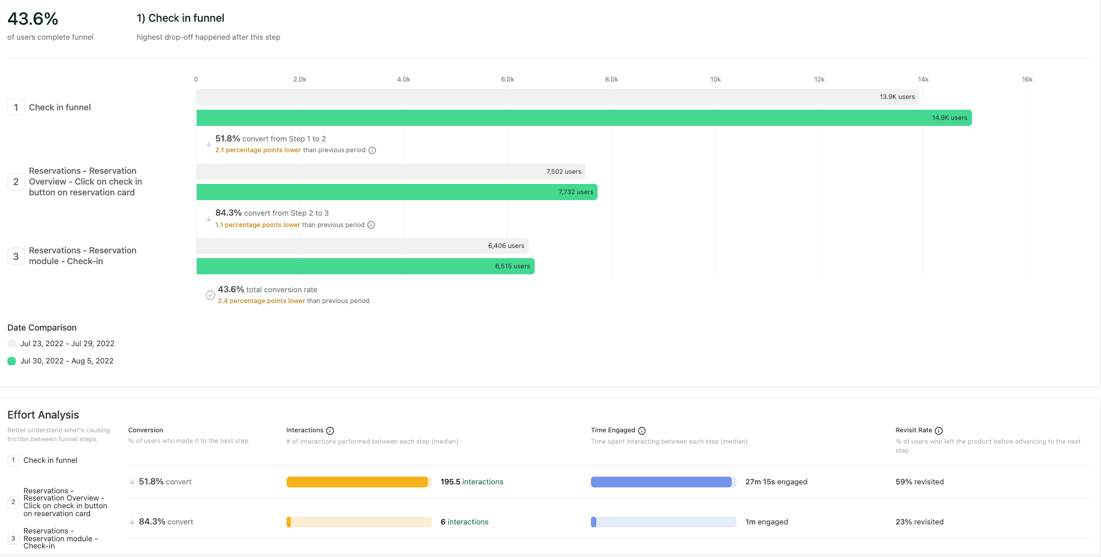Table of contents
Leverage data to fuel growth
In a world where we all have access to unlimited information at our fingertips, we’ve become so accustomed to being able to find information that satisfies our curiosity in the blink of an eye. It’s become all too easy to overlook the simple joy of having access to meaningful, much less actionable information in real time.
As a product manager, you likely spend some portion of your time sifting through ideas and opportunities. Like me, you probably ask several questions a day as you explore different problems and rely on some form of data to help you answer those questions and work towards a solution. Unfortunately, we don’t always have a way to access data that can help us answer our questions so that we can make fast decisions on a daily basis.
Now, when you’re building software at a SaaS company that continuously deploys both new functionality and improvements to an existing feature set and a growing user base, believe me, you want to have access to information in real time! You’re constantly looking for data that helps you understand the impact of the decisions you’ve made, as well as make informed decisions for the future.
When we look at qualitative research, data should be one of the tools that helps you identify whether or not you should persevere with your ideas, pivot towards a slightly different direction, or let the not-so-great ideas perish.
Many of us have struggled to gain access to data in time to help us make meaningful decisions. At Mews, our data team has been working on democratizing access to information so that the entire company can be confident in the decisions we make every day – and what a difference it’s made!
Picture this: you’re in your morning stand-up and one of the members of your team has been struggling with solving a problem. Naturally, they bring it to the team, and a discussion begins as one by one you each begin asking questions to understand the root of the problem. Naturally, we’d ask ourselves if an existing feature is currently in use, and if so, how often do users interact with it? How much time do they spend trying to solve this problem in their day-to-day, and how can our solution help them?
Within a few minutes, those questions lead to ideas. Ideas that could potentially solve this problem that may have been bothering a member of your team for a few days. Those suggestions are often followed by a slew of questions, a buzzing atmosphere, and a bright-eyed: “Hey! What if we did this [enter light bulb moment idea] and leverage this functionality to bring more value to our users?”
You now have a brilliant rush of ideas and an energized team, and by the end of your meeting, you may have a short list of what seems like some great ideas you’re ready to explore. Now it’s time to start answering those burning questions.
Typically, most of us would create an issue in Jira, YouTrack, or [enter the name of your preferred ticketing tool] so that a data analyst can give you the information to answer your questions. Many of these are simple questions about how the system is used. Questions that, if answered during your stand-up, would have helped you and your team decipher the great ideas from the ones that are a little off the mark without having to invest in the valuable time and expertise from the data analyst in your team.
These small bumps in the road result in delays in the time it takes to validate ideas, ask new questions, and iterate your concepts. We often refer to this as the time to value, which is how long it takes from the inception of an idea and the cycle taken towards its eventual execution. Throughout the cycle, you should be continuously learning and iterating. Truly great teams and product organizations can create short and efficient feedback loops so that they can make impactful decisions faster than competitors can keep up. Understanding your product through data plays a pivotal role in staying one step ahead.
Enter Heap
It may sound strange to say that a data analysis tool could make you giddy with joy – but there are few things I can compare to the pure joy of being able to find answers to data-related questions in less than five minutes! All without the need to slug through complex queries or spam data analysts with hundreds of “small” requests that often evolve into an entire dashboard. Because let’s face it, data questions are seldom answered by a single data point. Great data tells a story. And sometimes that story evolves drastically from your original question(s). An aggregated view of fine data points paints the bigger picture.
Let’s return to our morning stand-up from before. Time is money and bringing data to back up or disprove a hypothesis you have built is essential to deciding the viability and often feasibility of a new feature within your product. When my team and I started using Heap, we went from tugging at the strings of a new idea and investing time in running queries that may or may not eventually be disproven by the data we found, to answering our questions in real time because that’s simply the power of democratizing access to data within your organization.
Thanks to Heap’s auto-capture events feature, all interactions are tracked throughout your system. All you need to do is ask the right questions to get your answers.
While there are hundreds of applications for Heap, here are a few of my favorite examples.
Benchmark and experiment
Heap is great for saving time to get answers to simple questions, but it doesn’t end there! We’ve been building towards having a more experimental culture at Mews so that we can build faster and make impactful data-driven changes to empower our users.
When we pair Heap with Launchdarkly, we’re able to update the user interface (UI) of a feature we are beta testing and track how users interact with it, be it through clicks, form submissions, the time taken to perform an action, user funnels that can be continuously optimized, and more.
Through each step of the way, we’re able to compare a sample group of beta users with a control group that doesn’t yet have access to a feature. This has allowed us to build a case of the right questions to ask our beta users and a clear view of which functionality and adjustments in the UI are valuable to them. At the same time, the impact on their day-to-day processes is measured and compared to the users that don’t have access to the feature.
Process optimization
Improving a system is an iterative process. Small tweaks to the UI can either save time in man-hours or cost users’ valuable time.
With Heap, we’re now able to see how the adjustments we’ve made affected user engagement, the time to perform tasks within workflows, and the time between interactions in a funnel. All while comparing this information to previous periods to monitor change.
 An example of a user funner, in this case for check-in
An example of a user funner, in this case for check-in
Democratize access to data
An empowered team should be able to move fast, make decisions in real-time, and measure the outcomes. Access to the information that allows them to persevere, pivot, or perish is essential to maintaining tight feedback loops and exploring the right opportunities.
In order to find the right opportunities to invest in, you must be data-informed continuously from ideation to delivery. By incorporating data throughout your development cycle, you can prove and disprove multiple hypotheses more often, and start building a story with data that backs the decisions you make every day.
Since we’ve started using Heap, the lead time for obtaining information to make decisions has been cut down from an average of two weeks to less than 15 minutes. We’ve begun incorporating data throughout our development cycle, building, measuring, and learning as we scale. In short, we’re able to work more efficiently with greater impact for our users.

2026 Hospitality Industry Outlook
Download now
Table of contents
Hospitality hot takes straight to your inbox

.jpg?width=624&height=555&name=Thumbnail%20-%20600x395-50%20(7).jpg)

.webp)
